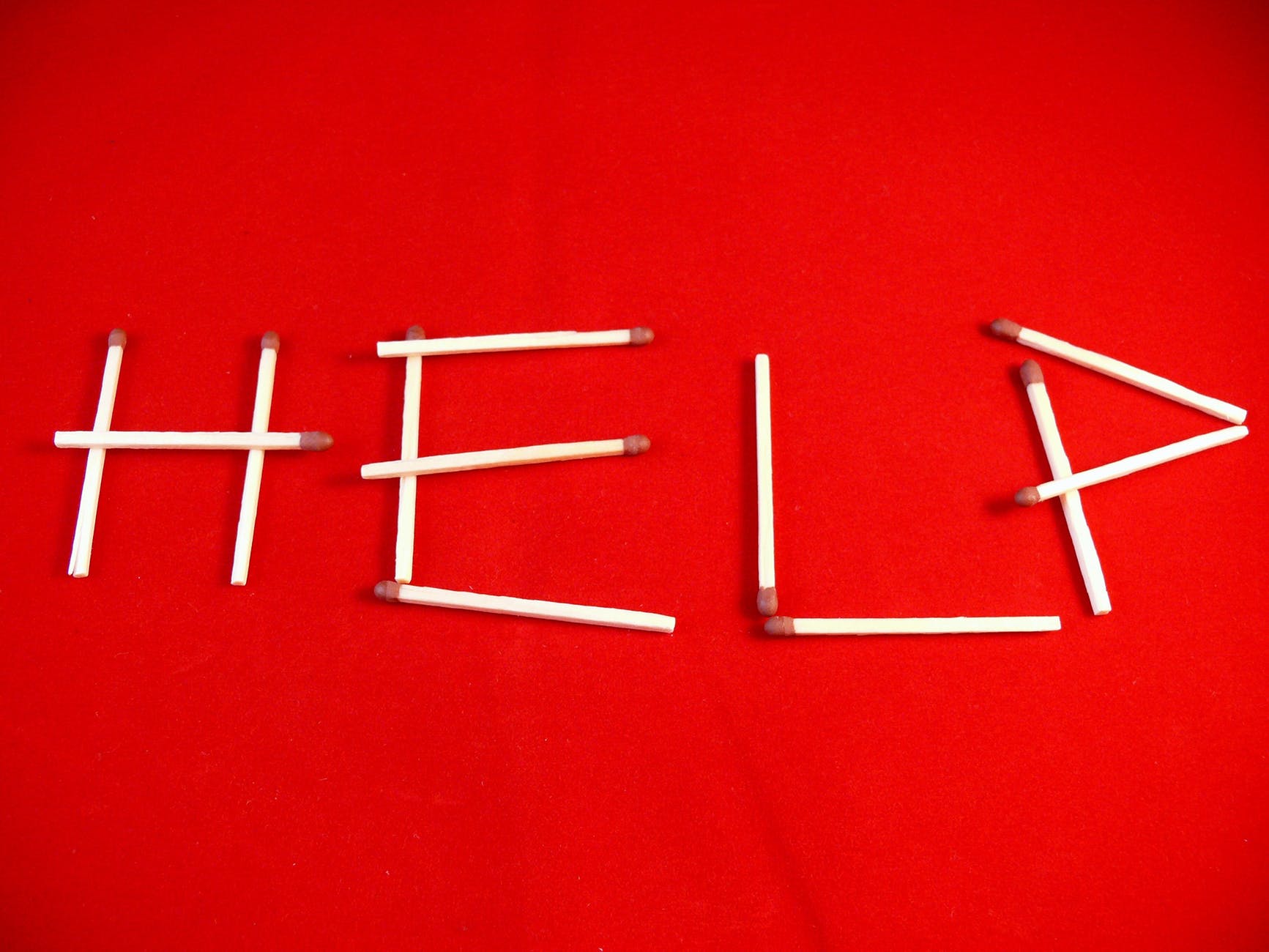Detaching from the Matrix…Small steps to big rewards
We are in a mess. We got this way because people forgot that the power brokers of the world treat life like a chess game, and we think of life like a daily or hourly experience.
A recent podcast discussion that I was a co-host on came up, in which the host asked the question, "Are Americans Rich?". The context was to do with whether we all shouldered the burden of charitable giving to other nations and whether that is something that should be done by the individual. The discussion brings up some very interesting dynamics, which I will attempt to give my opinion on in this article.
Let me answer the simple question, "Are Americans Rich?". NO. For the most part, they are not rich.
Rich is a subjective term. To someone who has very little, any form of abundance would be considered rich. I mean if you live in the slums of Bangalore and you have food, shelter & clothing, a slum resident might consider you rich. If you live in Los Angeles in an apartment in the San Fernando Valley and you are scraping by month to month, you might not consider yourself rich, but if you look at someone who lives in Beverly Hills and drives a nice car, you might think of them as rich. Rich, it would seem, is something you probably apply to other people who appear to be wealthier than you are.
My definition of rich is the following... Anyone who has abundance above their "burn rate", where that abundance is more than 50% of their annual total burn rate. What does this mean? Well let's say it costs you $50,000 a year to live. This would include your cost of shelter (rent, mortgage, etc.), your cost of food, insurance, health care, education, clothing, transport, communications, etc. If that totals up to $50,000 that is your burn rate. It will vary depending on where you live, and what your obligations are to generate income. If you lived in a village in sub-Saharan Africa, you wouldn't have anywhere near this burn rate. But your requirement to generate income would be less. So it is all relative.
If you exceed your burn rate by 50%, you might be perceived to be rich. That would be making more than $75,000 after taxes are deducted if your burn rate is $50,000. The additional $25,000 of wealth could be invested, etc. and consequently you may be perceived to be rich. You might not think of yourself as rich, but to someone barely surviving on $25,000 a year, you are rich. You see it is all relative.
OK, let's define poor now. By default, it would be anyone in the negative position of someone who is rich. Maybe it is someone who is 50% lower in their income than their burn rate. So if it costs you $50,000 per year to exist, but you only make $25,000 a year, then you would be poor.

So let's put this in context. You work hard, you earn at least 50% more than your burn rate, you live frugally and you don't overspend to increase your burn rate. Should you now feel obligated to fund the deficit of someone who doesn't share those same values?
The natural economic change that someone who is 50% income generation to burn rate would be to decrease their burn rate. Get a cheaper place to live, sell the car, downsize, sell off any surplus items on eBay, cut your cable bill, don't eat out at restaurants as much, etc. This is just frugality. But if you live in the USA, particularly if you live in a city where you have to be to earn income, how do you manage to live on $25,000 a year? I will tell you that it is basically impossible. You will be living on the street or in your car, and pan-handling for coins to buy food in that situation.
Contrast that to someone living in the slums of New Delhi and is it not the same? Are they also not begging for coins for food and living on the streets? Should charity be forced on those that earn more than their burn rate to fund sub-burn rate lving? Should that burden fall on the nation state to fund those that need assistance like that?
Clearly there are those in our world that have disabilities or are unable to function in society through no fault of their own. First world nations such as the USA have programs for those needing money due to disability and although it isn't much, it is enough to ensure that they can find affordable housing and food, etc. It is often an abused service, in that those with no disability manage to convince a medical practitioner to write up something that states they have a mental disorder that they clearly don't have, in order to get welfare from the state. This is clearly wrong, but the welfare is there for those with legitimate disability need.
But is that "Help"? I will say NO, it is not help.

I believe that it is our responsibility to "help" someone who is in dire need. For example, if someone is hurt in a car accident, I will be the first to pull over and provide assistance if I can. If someone falls down, I will try and pick them up. If there is an emergency, I will be happy to offer help in any way I can - whether that be financial or labor assistance.
But this is not because of being "rich". This is because I'm a human being and I don't want to see others suffer. I don't hide behind some religious belief or ideology that tells me I must do that. I simply do it because that is what I would want to receive if I was in that situation. It's about empathy and caring.
However this is a dangerous and slippery slope. I firmly believe that if I was to do the best thing to assist someone in a non-emergency situation, it would be to help them help themselves. If I could teach them how to learn a skill that would be in demand and valuable, then they would be prepared to increase their income to meet or exceed their burn rate. The alternative would be to help them learn to keep their burn rate as low as possible and remove further obligation on revenue generation. Again, the "rich" part of this is the excess between income & burn rate.
But there are social and human dynamics at play here. The first problem is that if you provide an ongoing stream of income to someone, then they choose not to advance themselves, learn new skills, etc. and do not become a competitive and functioning member of society. We see this play out in the so called "welfare states" where removing of the motivation and need to earn erodes the desire and leaves us with a dependent society. This isn't some ficiton - I've seen this with my own eyes in my home country of Australia.
Australians are hard working people. There is a "buck stops here" philosophy deeply etched into the psychy of Australians. Most of this comes from being so far away from the rest of the world that you are raised with an islander mindset. You learn to be all things to all people, rather than a master of one thing. Because you don't have the specialists around you as much, so everyone has to be self-supportive and an expert in many, many areas. This results in a social norm where people learn to repair their own cars, their houses, their technology, etc. rather than relying on others to do it for them. It means that society are highly skilled in many areas rather than being specialists in one. You'd think with that approach the country would be highly productive and efficient.
But this is a country born out of the English Wellington political model, where the House of Parliment controls all things and is seriously dysfunctional. There are no well defined political parties - where you can easily identify the ideology of one vs the other. They ebb and flo on issues to counter the other party, resulting in very little ever being agreed to or getting done. Yet the largest employer of labor in Australia is the government. Public servants are everywhere and to keep them busy, they invent projects, welfare and social obligations so that individuals are always tethered to the government. For example, let's say you are a small business owner. You chose that path because you wanted independence and the ability to be your own boss. But the level of regulations, tax collecting and duties owed to and payable to the government basically makes you a proxy public servant. When you charge someone for a product or a service, you collect GST (Goods & Services tax) which you then have to remit back to the government. You are effectively the tax collector at each transaction. For all costs, a tax component is part of it. Petrol costs are sky high and contain an enormous amount of tax. So to are cigarettes, beer, wine, etc. When you buy or sell a house, you pay "stamp duty" to the government on the transaction, not to mention any taxes due on profits made on the sale. You can't claim interest on mortgages. You pay a portion of your wages into "superannuation" (or your employer does this by direct deduction) which is a way the government avoids a general social security obligation on workers. This is a privatized obligation that funds retirees rather than the government. Medical insurance it applied as a percentage of your income tax, so that the government will control all medical facilties (with some exceptions) but you only get what the government provide in terms of health care if you have an accident or emergency. Almost every part of modern society includes some form of tax extortion by the government.
Additionally the government decides to fund large infrastructure and defence projects so that the income that is made by a large percentage of the work force comes from the government's initiatives. Even private corporate mining companies only get the right to mine by way of government licensing because the landowners in Australia are not allowed to own the very minerals or oil that might be underneath the plot of land they own title to and pay taxes on.

When you consider the involvement that the government have in all forms of income and all forms of expense, this looks more like communism than it does a democratic free market capitalistic society. There really isn't a label for this hybrid model. What is noteworthy, however, is that anyone that chooses to want to raise themselves up out of the norm becomes a slave to it. You start a business, you become the target of tax extortion. Therefore why would you ever do this? And that, my friends, is the problem when government assistance doesn't help.
You see in a model when the motivation to do extraordinary things is taken away by tax penalties, people choose not to do extraordinary things. In fact, by doing nothing and accepting welfare (the "dole" as they call it), you have no obligation whatsoever and you become totally reliant on the state to provide everything to you. Given the alternative of being a target of extraction by the state, is it not completely understandable that a huge portion of the population choose to live on state provided benefits? Of course this requires more funding, so the state extract more in taxes from those choosing not to be on benefits, and as they say, "The Hits just keep on comin'".
Other than an immediate "leg up" in times of emergency, charity can easily have a negative impact on the individual's ability to learn and grow and creates more of a burden by perpetuating the welfare state which we all ultimately are forced to pay for. I'm not saying that handing somene a dollar to get some food when they are down on their luck is not admirable, but I am saying that if the person becomes dependent on that level of income, they will never grow their way out of that cycle.
If you class yourself as rich, and you have abundance in excess of need, and you have security for you and your family, then a logical thing to do next as you advance towards the top of Maslow's hierachy of need, would be alturistic and philanthropic endeavors. You are reading one of those very endeavors right now. I have chosen to invest my time in teaching and spreading the knowledge of what I've learned over decades on my own journey towards become rich.

I am told that a wise man once said that it was better to teach a man to fish, than to give them fish. I support that philosophy. The best help I can give anyone is information.
Information is power. The information you are reading in beunconstrained.com helps to give you information that should keep you out of poverty and on the road to riches. But the only person who can take advantage of that is you. There is no free handouts here. There is free information though.
I also encourage anyone who has their own information to share to join with me here and publish it. If you would like to add to the collective wisdom of our articles, I'd love to read what you have to say. I can't say I'll accept all articles because many I may not agree with. But the best part of community is that we all together help to be unconstrained as a group. Contact me if you have something to contribute as I'd love to check it out.
Again, the answer is NO. The vast majority of Americans live paycheck to paycheck. They have little abundance at the end of each month. Most are enslaved in debt and are surrounded by the liabilities of lifestyle inflation - most of which they don't own. Big houses, big cars, new smartphones, college educated, etc. This all looks like they are rich. It is an illusion. For each item in this, there is normally a debt level far exceeding the value of the item. Cars are not bought with cash - it is credit. Education is funded with student loans. People don't pay cash for their homes. Consequently their cashflow might be positive, but their net worth is negative. This is the American way.
Until we realize that if you have any debt, you are not rich, we can't fix this problem and we can never be truly rich. So before you start to hand out money for charity to others, thinking that you are rich and have abundance, you might just want to do a personal balance sheet and realize you are in debt and should be paying that off first. It is like they say on an airplane, "If the oxygen masks fall from the ceiling, put yours on first before you assist others with theirs". Of course in the case of an emergency, render aid immediately. But if you are going to think that regular giving to charity while you are shouldering debt is advisable, consider that you may be perpetuating a dependency on welfare for someone else and you are not helping your own personal balance sheet at all.